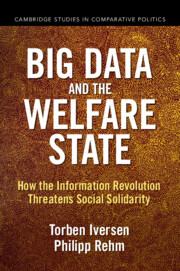Book contents
- Big Data and the Welfare State
- Cambridge Studies in Comparative Politics
- Big Data and the Welfare State
- Copyright page
- Dedication
- Contents
- Figures
- Tables
- Acknowledgments
- 1 Introduction
- 2 Theoretical Framework
- 3 A Brief Analytical History of Social Protection
- 4 Private Markets for Life and Health Insurance
- 5 Credit Markets
- 6 Labor Market Risks
- 7 Conclusion
- References
- Index
- Cambridge Studies in Comparative Politics
5 - Credit Markets
Published online by Cambridge University Press: 25 May 2022
- Big Data and the Welfare State
- Cambridge Studies in Comparative Politics
- Big Data and the Welfare State
- Copyright page
- Dedication
- Contents
- Figures
- Tables
- Acknowledgments
- 1 Introduction
- 2 Theoretical Framework
- 3 A Brief Analytical History of Social Protection
- 4 Private Markets for Life and Health Insurance
- 5 Credit Markets
- 6 Labor Market Risks
- 7 Conclusion
- References
- Index
- Cambridge Studies in Comparative Politics
Summary
Chapter 5 extends our framework to credit markets, which are not usually analyzed by scholars of the welfare state, yet fulfill many of the same income-smoothing functions. Much like in private insurance markets, more and better information allows for better risk classification, which enables lenders to tie interest rates more directly to default risk. This results in inequality because individuals with a higher risk of default are almost always lower income, and more information either raise their interest rates or cut them off from credit markets altogether. The welfare state matters, too, because generous social protection lowers default risk – something lenders take into account. Based on a data set containing the 39 million single-family loans that Freddie Mac purchased or guaranteed in the past two decades, we show that the interest rate spread markedly increased over time and we test, using a regression discontinuity design, whether information could have plausibly caused this increase. We also test whether social protection influences access to credit for different income groups and find that it does.
Keywords
- Type
- Chapter
- Information
- Big Data and the Welfare StateHow the Information Revolution Threatens Social Solidarity, pp. 105 - 158Publisher: Cambridge University PressPrint publication year: 2022



